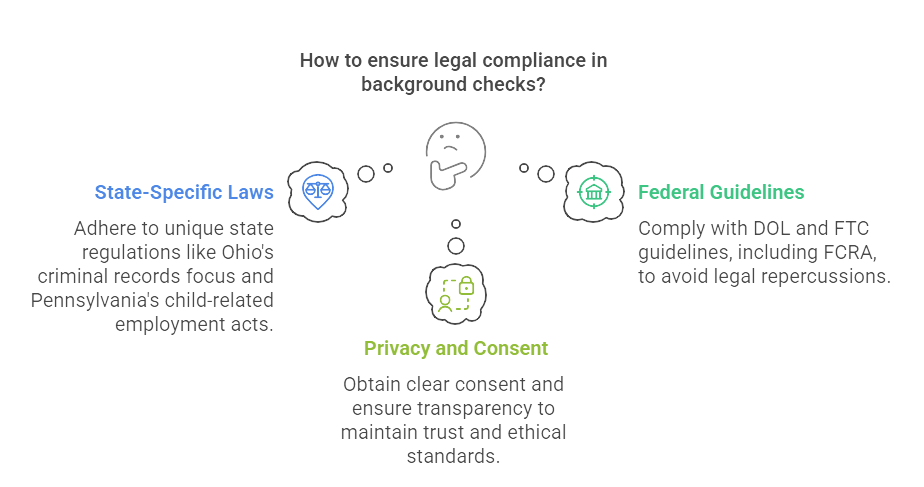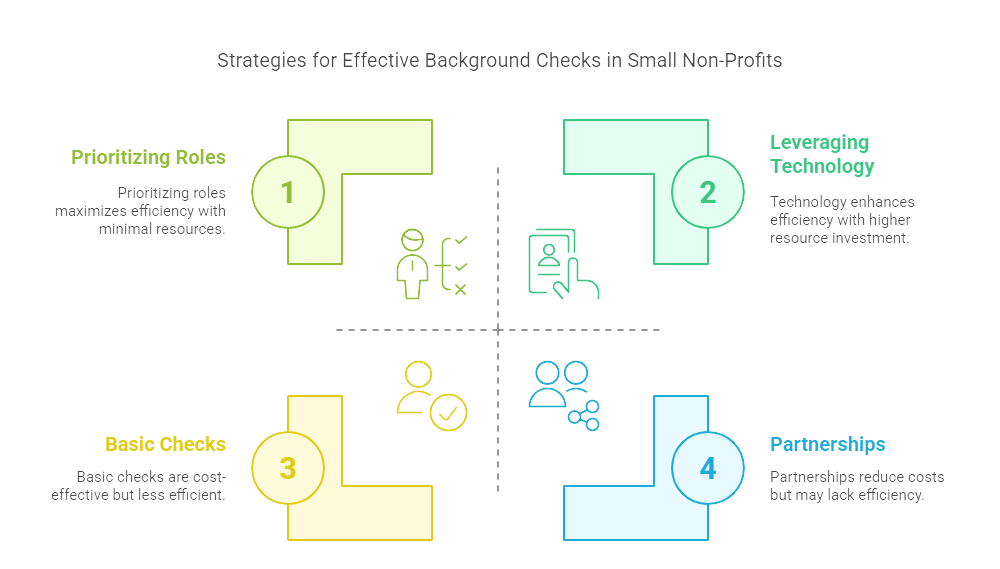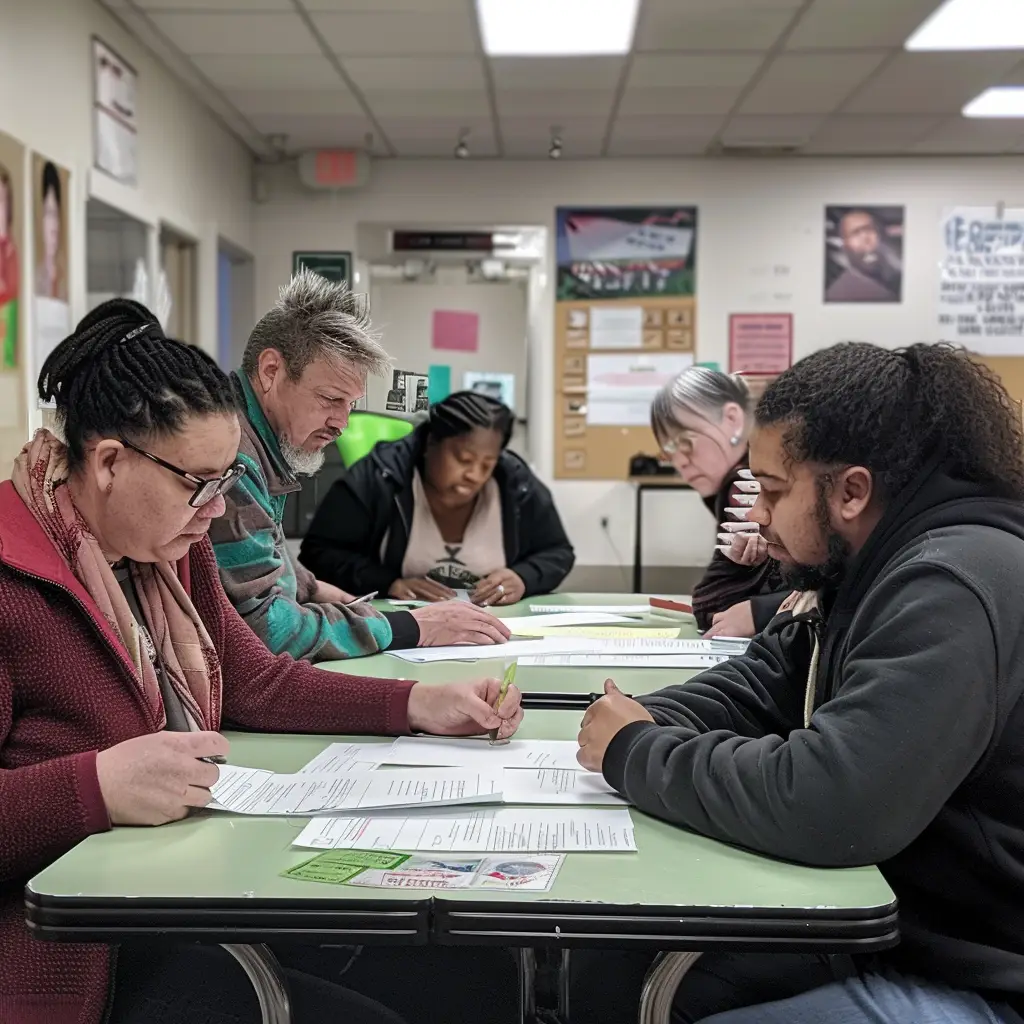Background checks are fundamental in establishing a safe and trustworthy environment within any organization, particularly non-profits. Unlike their for-profit counterparts, non-profit organizations often rely heavily on volunteers and diverse staff, making thorough vetting essential. Conducting background checks is not just a procedural formality but a critical step to ensure that the individuals brought into the organization align with its mission and values. This guide discusses best practices in conducting non-profit background checks, offering insights for business owners, HR professionals, recruiters, and job seekers alike.
Key Takeaways
- Background checks are crucial for non-profits to ensure that staff and volunteers align with the organization's mission and values, as they play key roles in maintaining trust within the community.
- Non-profit background checks focus on integrity and alignment with values rather than just skills, encompassing identity verification and criminal history, with some roles also considering credit checks.
- Legal compliance with state-specific laws and federal guidelines is essential for non-profits to conduct background checks ethically and to protect the organization from liabilities.
- Establishing clear policies, using appropriate screening tools, and ensuring transparent communication are best practices for conducting effective background checks in non-profit organizations.
- Job seekers can prepare for background checks by proactively running personal checks, addressing past issues positively, and improving their records to present a trustworthy image.
Introduction
Background checks matter because non-profits are about trust. They're not driven by profit but by purpose. Ensuring the right people join your team protects this mission. Volunteers, staff—they're the faces of the organization. They represent their values when working with vulnerable communities or managing donations. The point of a background check is to ensure everyone aligns with your ethics and goals.
What exactly do these checks involve? It's not just ticking boxes. You're looking at someone's history—from identity verification to criminal records. Each part tells you something about whether a person is the right fit. For non-profits, the focus might be less on credit scores and more on past conduct. It's about creating a culture of integrity and reliability.

Understanding Background Checks for Non-Profits
When it comes to non-profit organizations, background checks serve a crucial role distinct from those in the for-profit sector. Non-profits often operate on limited resources but with a mission-driven mandate, which means that ensuring the right fit extends beyond skills and experience—integrity and alignment with the organization's values are paramount.
First, let's define what non-profit background checks entail. At their core, they are about vetting potential employees and volunteers to minimize risks and protect the organization's reputation. Compared to the corporate world, where financial liabilities might be the main concern, non-profits must pay particular attention to issues that align with their work, such as previous volunteer experiences or advocacy.
Key components of a non-profit background check include:
- Identity Verification: This usually begins with an SSN trace. It's a basic step that confirms an individual is who they claim to be, forms the foundation of background screening, and helps unearth any aliases or past addresses, which are helpful for more in-depth searches.
- Criminal History: Checking criminal records is vital, especially in roles that involve working with vulnerable populations. Concerns like DUIs may be flagged, but the context is crucial. The goal isn't to dismiss potential candidates based outright on past mistakes but to ensure any issues are openly addressed and do not conflict with organizational values.
- Credit Checks: While less common, they might be relevant, particularly for roles dealing with financial responsibilities. Knowing a candidate's financial background can be indicative of their potential reliability in handling funds. However, because this can be sensitive and sometimes unrelated to the duties, it must be approached selectively and in the context of role requirements.
In all cases, the emphasis for non-profits should be on relevance, fairness, and transparency. Background checks are about creating a secure environment where the mission thrives, and everyone feels aligned and respected.
EXPERT INSIGHT: As one who's had the privilege of serving mission-based organizations, I can personally attest that a nonprofit's greatest asset is people who advance its mission. When we invite an individual into that inner circle—staff or volunteer—we are not simply hiring. We are entrusting them with our values, our communities, and our mission. It's no wonder nonprofit background screening isn't just policy—it's stewardship. It's protecting the people we serve, and protecting our mission that we've promised to uphold. Screening, done with sensitivity, with transparency, with integrity, is an act of responsibility, not restraint. - Charm Paz, CHRP
Legal Considerations
When it comes to conducting background checks, non-profits must navigate a complex landscape of legal requirements that vary by state and federal agencies. Staying compliant is not just a box to tick; it's essential to protect the organization from potential liabilities and maintain the trust of both beneficiaries and the public.
State-Specific Laws
Different states have different rules regarding background checks. For instance, Ohio and Pennsylvania have unique regulations that non-profits must adhere to when vetting potential volunteers and employees. Ohio law places a strong emphasis on criminal records and fingerprinting for certain positions, especially those involving vulnerable groups. Pennsylvania, on the other hand, requires compliance with Act 34 and Act 151 for positions in child-related employment. Non-profits operating in multiple states need to stay abreast of the local legislation to ensure they aren't inadvertently breaking any laws.
Federal Guidelines
At the federal level, guidelines from the Department of Labor (DOL) and the Federal Trade Commission (FTC) provide a framework for conduct regarding background checks. The DOL offers general advice on what employers need to consider during the hiring process, while the FTC lays out the rules for ensuring compliance with the Fair Credit Reporting Act (FCRA). Employers should ensure that they are not only aware of these guidelines but also integrate them into their hiring processes to avoid costly legal repercussions.
Privacy and Consent
Obtaining consent from candidates is non-negotiable. Before conducting a background check, it's crucial to inform individuals of the checks being performed and secure their written permission. Transparency here is key. Providing details about their rights—including their opportunity to dispute any findings—is both a legal requirement and a mark of ethical practice. Simplify consent forms, emphasize clarity, and uphold confidentiality to foster an environment of trust and integrity within your organization. By honoring privacy rights, non-profits not only remain compliant but also strengthen organizational credibility.

Best Practices for Conducting Background Checks
Implementing effective background checks in a non-profit setting doesn't have to be daunting. Start by establishing clear policies. Consistency is key; all applicants should know exactly what's involved. Clear guidelines not only streamline the process but also ensure fairness.
Choosing the right screening tools is another cornerstone. While criminal records and identity verifications are staples, consider the relevance of other checks. For instance, drug tests may or may not be necessary depending on your organization’s mission and values. If you decide to include them, clarify what failing a test might mean for the applicant. It’s all about tailoring the checks to fit your needs.
Communication with candidates can make or break the process. Clearly explain each step, including potentially baffling terms like "disposition." This builds trust and helps candidates understand what’s happening at each stage.
Lastly, using data responsibly is non-negotiable. All information must be stored securely and used solely for its intended purpose. Mishandling sensitive data is not just a legal risk but can also erode trust, which is the foundation of any non-profit endeavor.
How Job Seekers Can Prepare for a Background Check?
The thought of a background check might be nerve-wracking, but being ready is your best bet. Here’s how you can step up your game:
- Personal Background Check: Run your own check before they do. This way, you know what to expect and can fix any mistakes or surprises—like a wrong address or old job title. Plenty of online services can help you see a version of what future employers might see.
- Common Concerns Answered: Worried about that old speeding ticket or the time you flunked a drug test? Each organization has its deal breakers, so know how your past fits into today's job market. If you have prior offenses, be ready to explain them honestly, but put a positive spin on it. Did you learn from that DUI? Highlight how you've changed.
- Improving Your Record: Can't change the past, but you can improve today. Clear old debts, clean up your social media, and maybe get involved in community work to show you're active and engaged. If possible, consider expungement for eligible offenses to tidy up your record legally.
By being proactive and tackling your background check, you're in a better spot to address concerns upfront and present your best self when the opportunity knocks.
Background Checks for Small Non-Profit Businesses
Small non-profit organizations often tread a fine line between maintaining financial viability and implementing comprehensive background checks. The challenges are pronounced due to limited resources and budgets. Yet, these checks are crucial in ensuring the safety and integrity of their mission-driven environments.
One common issue small non-profits face is the cost of thorough background checks. Unlike larger entities, they might not have the funds to invest in expensive, detailed checks. A practical solution is to prioritize checks based on roles—some positions might require more intensive scrutiny, while others might not need the same level of detail.
Another challenge is time constraints. Many small non-profits rely heavily on volunteer efforts which means rapid onboarding processes. To address this, organizations can adopt streamlined background check processes. Leveraging technology, like online verification tools, can speed up the process without compromising thoroughness.
Collaborations and partnerships can also offer significant benefits. By partnering with other non-profits or small businesses, small organizations can share resources and reduce the cost burden associated with background checks. These partnerships might extend to bulk purchasing agreements with third-party checks services, which can offer discounted rates for multiple checks.
Together, these strategies can help small non-profits overcome the hurdles posed by resource limitations while maintaining robust and reliable background check practices.

Conclusion
In the dynamic landscape of non-profits, establishing trust through diligent background checks is non-negotiable. We've unpacked key practices to make this process robust and relevant. Tailoring these checks to your organization's unique needs not only safeguards its integrity but also aligns with its mission and values. As stakeholders, the onus is on us to adhere to these best practices, ensuring every individual involved bolsters the collective mission. Strive to integrate these insights and contribute to a transparent, safe, and effective organizational ethos. In doing so, you offer not just an efficient operational environment, but one that genuinely reflects the altruistic spirit your non-profit embodies. Choose your candidates carefully to match your values and mission. The choices you make today will shape the impact you have tomorrow.

GCheck Editorial Team
Meet the GCheck Editorial Team, your trusted source for insightful and up-to-date information in the world of employment background checks. Committed to delivering the latest trends, best practices, and industry insights, our team is dedicated to keeping you informed.
With a passion for ensuring accuracy, compliance, and efficiency in background screening, we are your go-to experts in the field. Stay tuned for our comprehensive articles, guides, and analysis, designed to empower businesses and individuals with the knowledge they need to make informed decisions.
At GCheck, we're here to guide you through the complexities of background checks, every step of the way.






